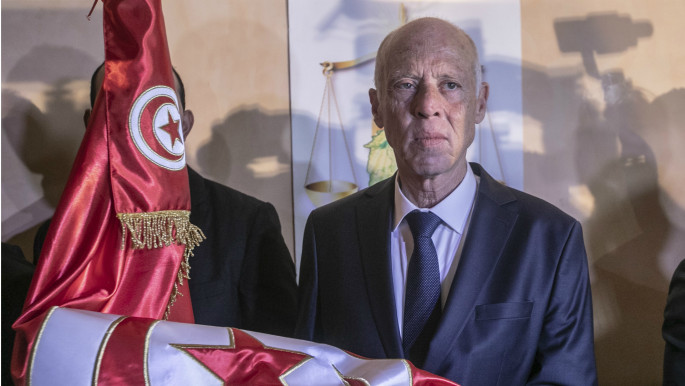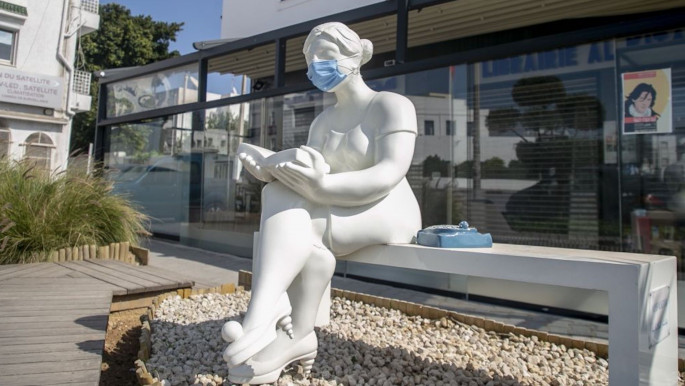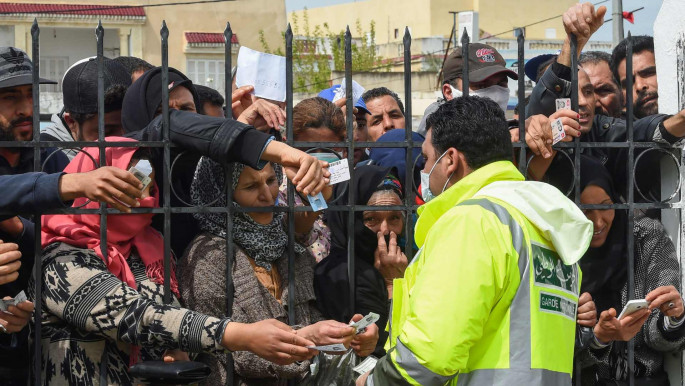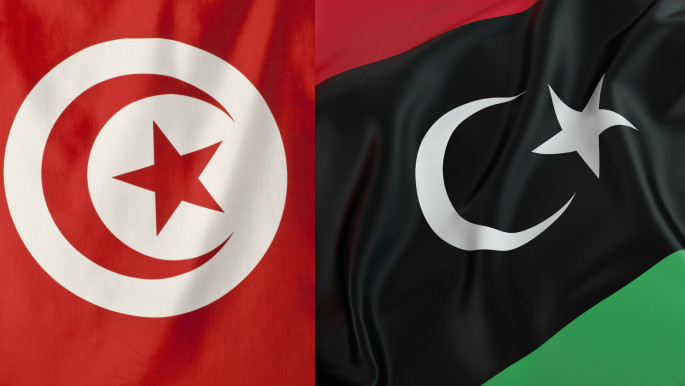A shaky start: Tunisian President Kais Saied's first six months in power
But six months in, his presidency has been marred by two national crises. Political gridlock surrounding the efforts to form a government dominated the first four months of his time in office, and the coronavirus pandemic has since engulfed the country. There have also been other issues related to foreign policy.
A constitutional law expert with no party affiliation, Saied distinguished himself from the other presidential candidates with his austere manner and his insistence on speaking fusha, the Standard Arabic not used in everyday speech by Tunisians. Saied prided himself on his political independence and developed an ascetic, incorruptible image.
These qualities proved popular in the election, especially in the second-round run-off against Nabil Karoui, a media mogul whose image was tarnished with corruption. Yet they have so far worked against Saied during the two major crises which have defined the first six months of his presidency.
Repeated efforts to form a government
 |
|
| Read more: 'Turning a new page': Tunisia picks law professor as new president |
When Saied took office six months ago on 23 October, it was already clear that it would not be easy to form a government. Continuing the electoral pattern which has brought political instability since the 2010-11 revolution, 20 different parties had won seats in the Assembly, along with 12 independents.
No single party has ever won a majority in the Assembly, but its make-up in 2019 was even more disintegrated, with Ennahda, the largest party, slipping to less than 20 percent of the vote.
This gave Ennahda the chance to nominate a prime minister to form a government; but Habib Jemli, the party's choice, failed to find a majority of votes for his proposed government.
After two months of negotiations in which he tried to bring four disparate parties together, Jemli proposed a government made up entirely of 'independent' ministers, many of whom were known to be sympathetic towards Ennahda. On 10 January, Jemli received only 72 of the 109 votes required for a majority.
It then fell to the president to choose a different prime minister. On 20 January, Saied appointed Elyes Fakhfakh, who had failed to be elected to the Assembly and whose party, the Democratic Forum for Labour and Liberties, had not secured a single seat.
Ennahda expressed disappointment at Fakhfakh's initial proposal for a government on 15 February, and without the support of the Assembly's biggest party, the proposed government was well short of the votes it needed.
There were also issues raised by a number of key parties, including the Democratic Current, the People's Movement, and Tahya Tounes. It looked as though Saied's unorthodox choice of Fakhfakh would lead to a repeat of the Jemli debacle.
 |
With the decisive mandate of over 70 percent of the second-round vote, Saied's election victory inspired optimism that he might bring unity and stability to Tunisia's fragmented political scene |  |
With another rejected government in sight, Saied urged for a compromise from the relevant political parties. Referring to Article 89 of the Constitution, by which the president can call fresh elections if four months pass without a government, he threatened: "If the government does not get the parliament's confidence, we will go back to the people."
In light of Ennahda's disapproval and the pressure from Saied, Fakhfakh made some adjustments to his proposed government, and on 27 February the proposed government received the confidence of six major parties, securing the majority it needed in the Assembly.
Tunisian governments have been notoriously unstable since the revolution - the country has had a total of nine in under ten years - and the coalition which Fakhfakh has established is fragile.
It lacks a clear economic and social agenda, perhaps inevitably as it includes ministers from parties ranging from the leftist People's Movement to the economically liberal Ennahda. Nevertheless, it has held together so far under pressure from Saied and united around a broad programme of eight key priority areas.
 |
|
| Read more: Tunisia's tourism sector could lose $1.4 billion in revenues due to coronavirus |
By the time Tunisia finally had a government in place, Saied's second crisis was already beginning to emerge. In the ceremony on 28 February in which power was officially handed over from former prime minister Youssef Chahed, Fakhfakh referred in his speech to the new coronavirus as one potential threat facing the country.
For the newly appointed ministers - many of whom had never before held ministerial posts - the arrival of coronavirus was a baptism of fire.
Response to the Covid-19 pandemic
Saied's role in determining the country's coronavirus measures has been much less significant than that of many presidents in countries whose constitutions allow for more executive power in the president. Fakhfakh and his government have been the central decision makers.
On 4 April, the Assembly voted to hand over full decision-making power to Fakhfakh. For a period of two months, he is empowered to rule by decree, with the president not even required to sign off new law.
It was Fakhfakh who announced on 22 March a 2.5 billion dinar (£689 million) fund to tackle the social and economic impact of the virus, and his Interior Minister who warned on 7 April that manslaughter charges could be brought for those who ignore the lockdown measures and contaminate others.
Saied has nevertheless played an important symbolic role. In his much-anticipated first speech to the nation on 17 March, the president cautioned against panic and sought to create a sense of national solidarity by promising to donate half of his salary to the national effort against the virus.
Yet the speech was met with incomprehension by some and even mockery from others. Delivered in his usual fusha but with greater formality and affectation than ever, many Tunisians struggled to understand Saied's content and message.
 |
Tunisian governments have been notoriously unstable since the revolution - the country has had a total of nine in under ten years |  |
Subsequent speeches have likewise been met with bewilderment, and many Tunisians have even had to wait for the follow-up speeches by Fakhfakh to understand what has been announced by their president.
Nevertheless, it fell to Saied as president to announce the 6pm-6am curfew (from 18 March) and daytime restrictions (from 22 March). He has also played a visible role in consulting with members of government and co-ordinating efforts with other heads of state.
Saied has met to discuss the coronavirus measures with Fakhfakh, has chaired the numerous meetings of the National Security Council at the Carthage Palace, and has had calls with heads of state including President Mattarella of Italy, President Abdel Fattah al-Sisi of Egypt, and King Salman of Saudi Arabia.
Fearing an outbreak of coronavirus in prison, Saied also decided to free 670 prisoners – and reduce the sentence of hundreds more – to mark the 64th anniversary of Tunisia's independence from France, on 19 March.
On 31 March he issued a special pardon to a further 1,420 prisoners to reduce congestion in the country's jails, which have become even more crowded since over 1,000 have been arrested for breaching lockdown regulations.
Although Tunisia has been quite successful in keeping the number of coronavirus-related deaths to a minimum – only 40 at the time of writing – the economic effects of the lockdown have been felt heavily across the country and have provoked large protests in parts of Tunis.
 |
|
| Read more: Hundreds of impoverished Tunisians protest coronavirus lockdown |
Though Fakhfakh has been responsible for many of the key decisions, the president has come under considerable scrutiny during this public health crisis. His detached style and esoteric rhetoric have not endeared him with many citizens who crave simplicity and clarity more than ever.
Trouble with foreign policy
Alongside these two major crises of Saied's presidency, the president has also had public disagreements over foreign policy relating to Libya and Israel.
According to Tunisia's 2014 Constitution, foreign relations are an area in which the president is charged with determining the 'general orientations of the state', although the Foreign Minister is responsible for the specifics of foreign policy.
On two occasions Saied has publicly claimed control over contentious foreign policy issues after disagreements with an ambassador and a minister.
Saied has continued the policy of his predecessors Moncef Marzouki and Beji Caid Essebsi of maintaining a cautious position on the civil conflict across the border in Libya. He has continued relations with the UN-recognised Government of National Accord (GNA) without having condemned General Haftar's war against it.
When the Tunisian Defence Minister Imed Hazgui undermined this stance by referring to forces loyal to the GNA as 'militias' in an interview with local radio, the president was public in his dismissal of Hazgui's words.
 |
Alongside the two major crises of Saied's presidency, he has also had public disagreements over foreign policy relating to Libya and Israel |  |
Saied called his GNA counterpart, the Islamist-backed Fayez al-Sarraj, to reassure him of the unchanged Tunisian position, and on 15 April the Presidency issued a statement which restated its policy of neutrality – affirming that "the solution in Libya can only be reached by Libyans themselves" – and played down the remarks by his Defence Minister.
"The statements in discordance with our stance have either been misinterpreted or were circulated with the aim of suggesting that the Tunisian position has changed," he said.
In this confusion around the Tunisian stance on Libya, Saied was reaffirming his previous position on a contentious issue. But in a clash with the Tunisian Ambassador to the UN back in February, Saied attracted criticism for firing his ambassador who had been largely in line with the president's own previous stance on Israel.
The ambassador Moncef Baati helped draft a UN resolution strongly hostile to the US peace plan, which Saied had himself called "the injustice of the century", in a reference to President Trump's description of it as "the deal of the century".
 |
|
| Read more: Key Libya middleman Tunisia is left out of the Berlin conference |
Baati's wording continued Saied's hard-line approach to Israel which had been a rallying cry in his presidential campaign. Since being elected, Saied has doubled down on his remarks that any relations with the Jewish State constitute "high treason".
But as Tunisia's stance on the US peace proposal seemed increasingly out of line with other Arab states which were opting for softer wording in the UN resolution, Saied distanced himself from Baati's work and sacked his ambassador, calling him an "undisciplined diplomat".
Saied has found himself widely criticised for what has been seen as an attempt to scapegoat an official over his own political miscalculation.
Profound challenges ahead
Six months in, Saied's presidency has been the story of two major crises against which he has been largely helpless. With his lack of party ties, his austere and distant manner, and the weak presidential system which he has inherited, Saied has had little room for manoeuvre.
When the pandemic has passed, Saied will have to pin his hopes on an orderly period of economic recovery. But the unprecedented challenges he has faced must be seen in the context of the backdrop of the wider economic problems which Tunisia has experienced since the revolution: stagnating economic growth, high levels of unemployment, and an inflation rate at around 7 percent.
In the aftermath of coronavirus, Saied may face being blamed for a much bleaker economic picture over which he has had little control.
The next presidential election will not be held until 2024. By then, the early crises of 2020 may be a distant grim memory from which the young democracy has bounced back. Alternatively, they may stand out starkly as heralding the beginning of severe economic hardship.
Aidan Chivers is a freelance journalist who writes mainly about politics. He is a recent Oxford graduate and is currently enrolled on a Master's programme which will include terms in France, Tunisia and Turkey.
Follow him on Twitter: @AidanChivers





 Follow the Middle East's top stories in English at The New Arab on Google News
Follow the Middle East's top stories in English at The New Arab on Google News


